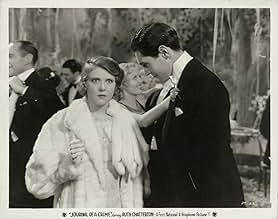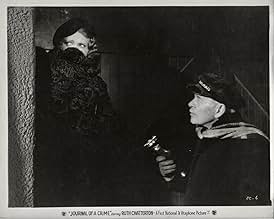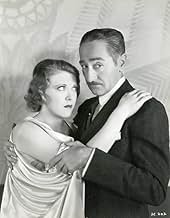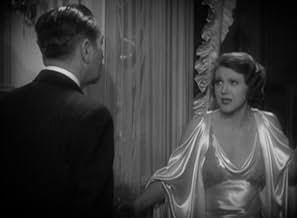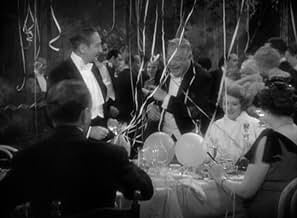A wife shoots her husband's mistress. Afterwards, she is tormented by guilt when someone else is blamed for the crime.A wife shoots her husband's mistress. Afterwards, she is tormented by guilt when someone else is blamed for the crime.A wife shoots her husband's mistress. Afterwards, she is tormented by guilt when someone else is blamed for the crime.
- Director
- Writers
- Stars
- Germaine Cartier
- (as Douglas Dumbrille)
- Frau Winterstein
- (as Elsa Jansen)
- Paul's Valet
- (uncredited)
- Chorus Girl
- (uncredited)
- Man at Play Party
- (uncredited)
- Director
- Writers
- All cast & crew
- Production, box office & more at IMDbPro
Featured reviews
In this film, she's married to Adolph Menjou. Menjou is in love with the ingénue lead in his play. She's playing for keeps and warns her lover if he doesn't get a divorce, they're through. Chatterton overhears this and kills her during a rehearsal. Her husband knows about it, but another man, a bank robber, is arrested. She refuses to go to the police.
It's actually a psychological drama, with Menjou predicting she will destroy herself because of guilt. She does start to sink downhill.
Some say this was a weak ending, and I suppose it was, but it is an interesting one, if contrived. I kind of liked it.
I think it's worth seeing some of these very early stars, and I especially enjoy Ruth Chatterton's performances.
Francoise Mollet (Chatterton) gets wind her husband, Paul (Adolph Menjou) is having a serious dalliance with a stage actress that threatens her marriage. When she fails to reverse his course she heads to the theatre and blows the thespian mid rehearsal away. By the oddest coincidence though a bank robber who has just murdered a teller takes refuge at the playhouse is captured and charged with her murder as well. Paul knows better however and decides to let his "fiend" wife stew in her own juices before confessing.
The preposterous scenario is too far fetched to give Journal of a Crime a passing grade but Ms. Chatterton is every bit as effective as she was in the classic Dodsworth living out the same self absorbed, petty existence of delusion and humiliation but with more dire consequence. Menjou displays some interesting restraint as Paul who in his own way and with less explanation does some unorthodox enabling that not only keeps Ruth from being fried but also buys enough time to have another misfortune benefit her. The turn of events that may save Francoise however only builds the case against the incredulous plot that dooms this film.
When he comes home Menjou does finally tell Chatterton it's over, but that drives her to a homicidal rage. She does shoot Dodd, but has a stroke of luck in that Noel Madison, a bank robber who had shot and killed a teller during a robbery took refuge in the same theater location and gets arrested. She gets away with it except that Menjou finds evidence to arrest his wife. He hides it, preferring to let Chatterton work it out for herself, one way or another.
The title comes from the fact that Chatterton as a kind of self therapy starts keeping a journal of her conscience. She's not a hardened criminal, just a woman who was done wrong. The film is totally dominated by her performance.
Though Journal Of A Crime is excessively melodramatic, it does give Ruth Chatterton a really good role where her facial expressions like in a silent film contain more than pages of dialog. In the end fate has an interesting ending for her and Menjou for that matter.
- BANG! -
Then the crime takes place, and by amazing coincidence a bank robber just happens to be hanging around backstage to take the fall for the real culprit. The coincidences now start piling on faster and faster, crammed into an incredible 64 minutes whose tortuous twists and turns are probably the result of the writing being on the wall about the new Production Code just months away. The code wasn't in force yet, so both adultery and murder go unpunished; but the narrative that follows twists itself into greater and greater contortions in seeming anticipation of Joseph Breen's coming blue pencil.
By the time Warner Bros. released "Journal of a Crime," Ruth Chatterton was history on the Warners lot, her contract not renewed in February 1934, along with another troublesome actor, Richard Barthelmess. Both had protested the major studios' plan to reduce salaries for talent across the board in 1933, and both paid the price. Ruth Chatterton was earning over $375,000 a year when Warners let her go, the ostensible reason being that she hadn't had a hit since Frisco Jenny. Chatterton's husband at the time, George Brent, still under Warner's contract, then refused an assignment to work as co-star in 'Mandalay" and was put on indefinite suspension while the lawyers hashed things out. Although Chatterton appeared in a few more movies for other studios after her departure from Warners, her film career was pretty much over after this movie. For that matter, First National Pictures, which was a separate production unit at Warners, was merged into Warner Bros. in 1934. First National's production supervisor, Hal Wallis, had taken over Darryl Zanuck's job when Zanuck left Warner Bros. to protest the unfairness of cutting in half the pay of many studio employees in 1933 while top management kept their salaries in full. Warners was a studio with a mission to cut expenses, requiring movies to be made in 18 days (3 weeks, in the 6 long day movie studio work week, until overtime laws covered Hollywood craft workers in 1939) and trying to keep down the salaries of acting talent. Chatterton cost too much, her contract was up and she was out in the new, penny pinching Hollywood.
Did you know
- TriviaThe opera shown on the theatrical posters in the opening scenes is "Adelia," by Donizetti.
- GoofsSomeone as "highly intelligent" as Francoise would not have disposed of the murder weapon in a bucket of water, where someone would be sure to find it.
- Quotes
Dinner Guest: The way I look at it, Mr. Attorney General, there will be crimes of passion as long as there is passion.
Germaine Cartier: In my opinion, madame, the urge to kill has roots in hatred, rather than in passion or in love. Hatred in it's most severe form. Jealousy. Don't you agree with me?
Francoise Moliet: Well, you may be right, Mr. Attorney General. I don't know, but, a woman - or a man - may have a deeper motive for killing than jealousy or even love. A human being could kill because she herself has first been killed. Before she kills, the other two, the victim and her accomplice, must have killed her soul. Murdered it. A soul that murders in it's turn.
- Crazy creditsOpening credits are shown on the pages of a book, a reference to the "journal" in the title.
- ConnectionsRemake of Une vie perdue (1933)
Details
- Release date
- Country of origin
- Languages
- Also known as
- Dnevnik zlocina
- Filming locations
- Production company
- See more company credits at IMDbPro
- Runtime
- 1h 5m(65 min)
- Color
- Sound mix
- Aspect ratio
- 1.37 : 1

